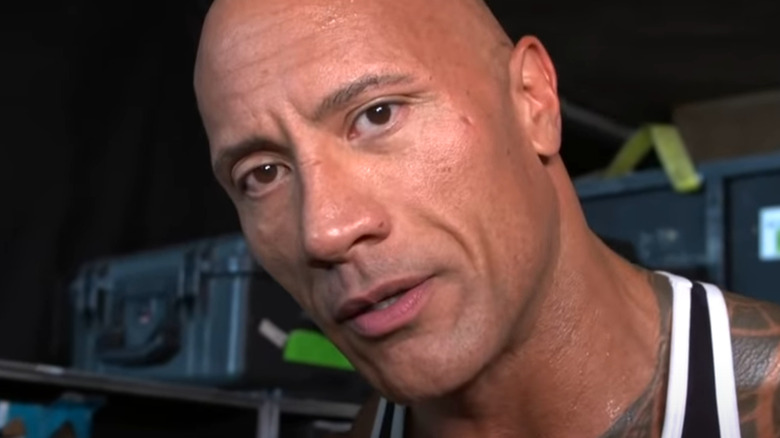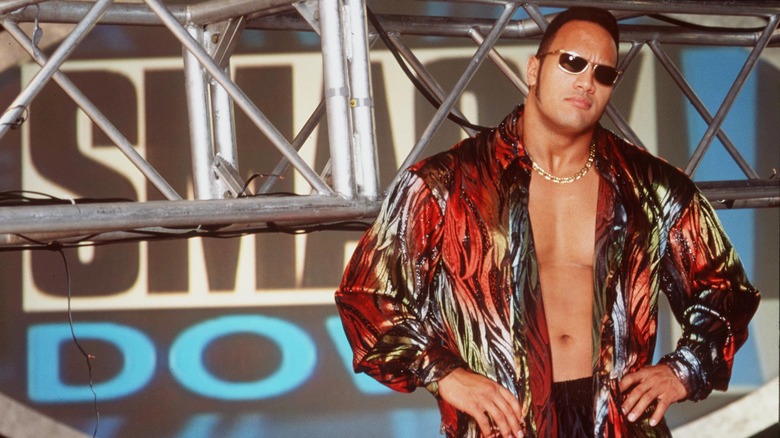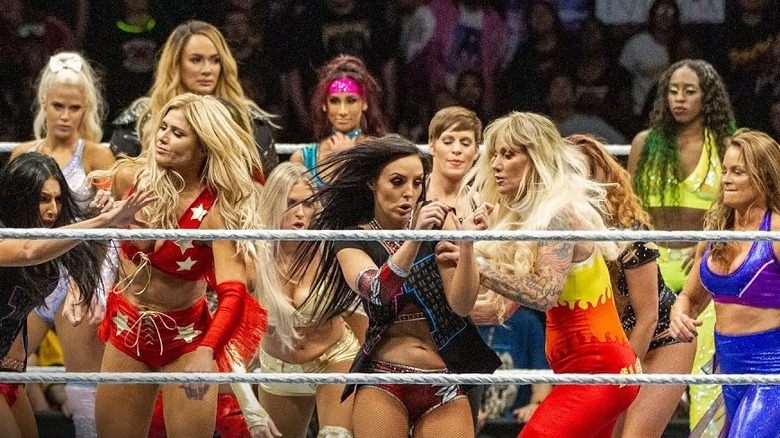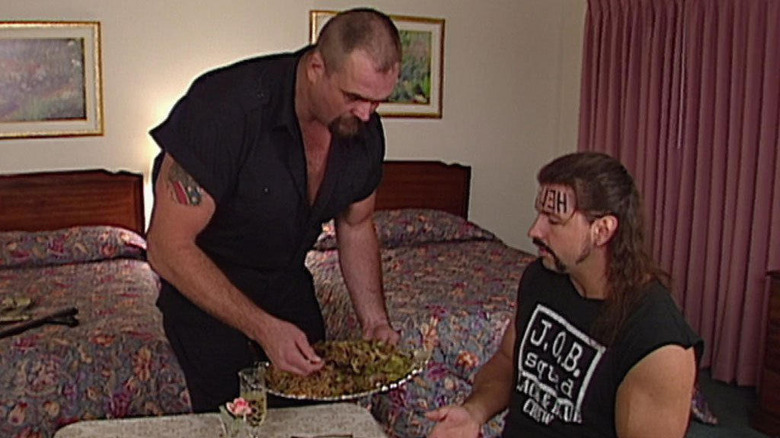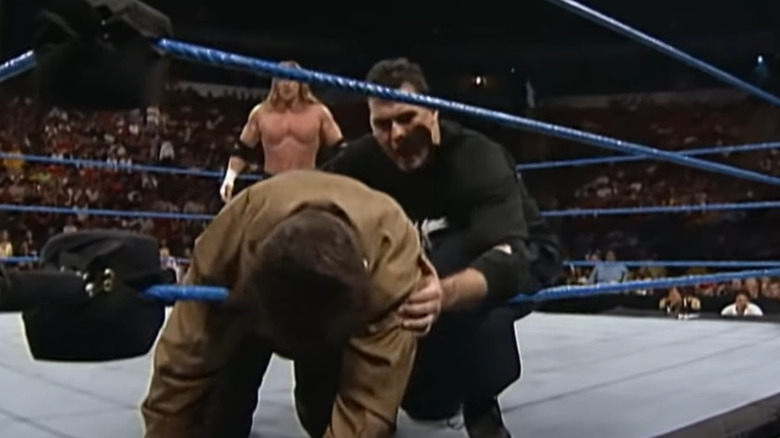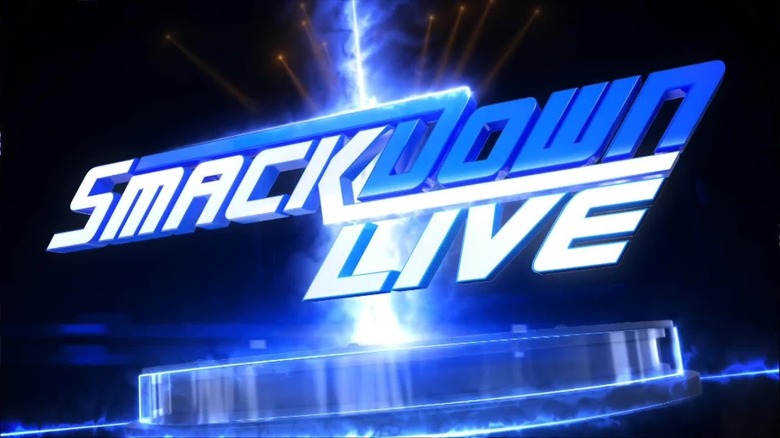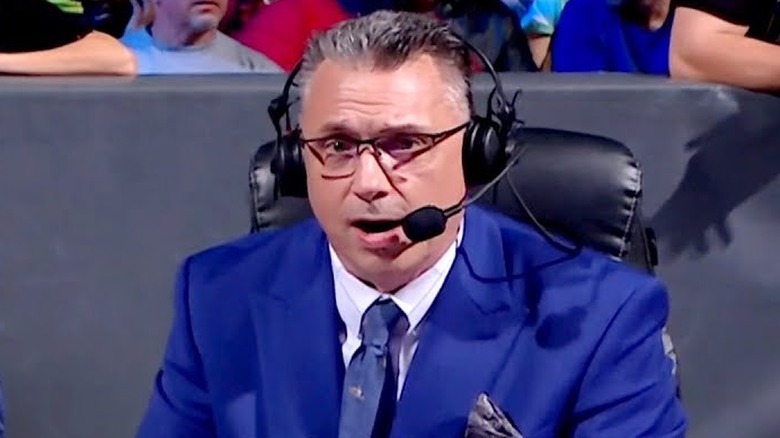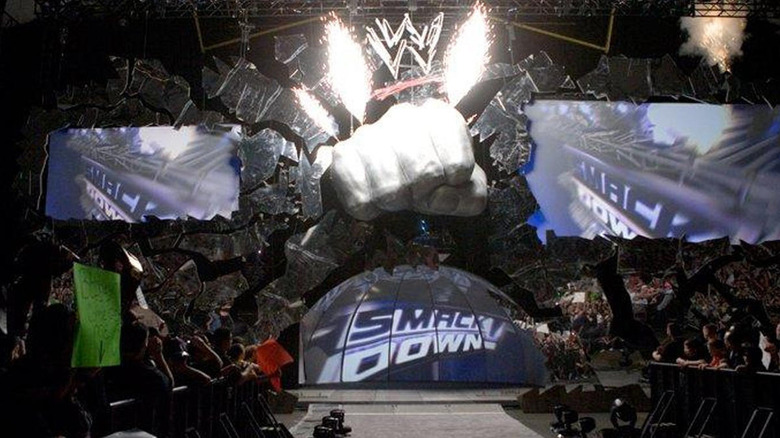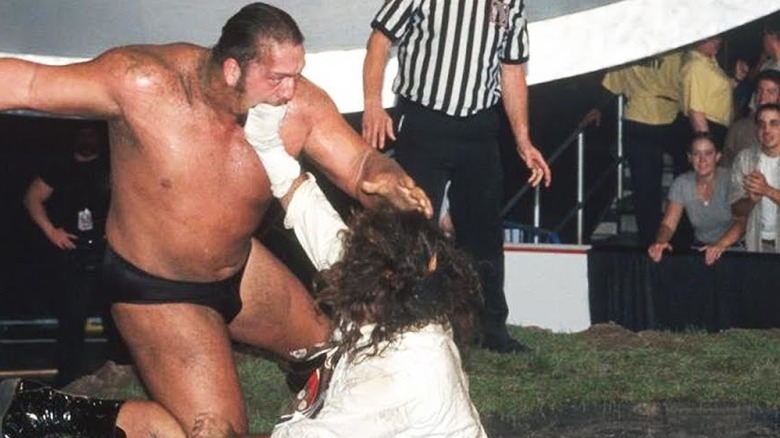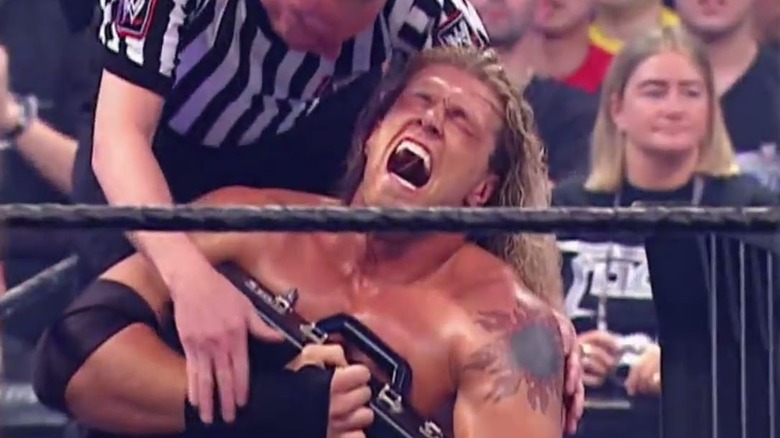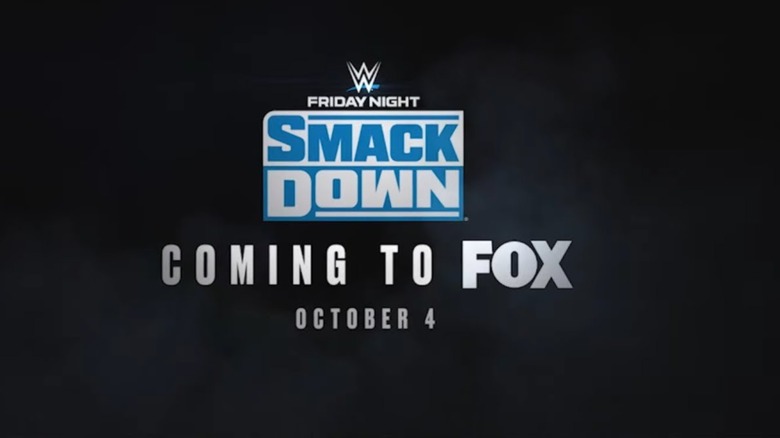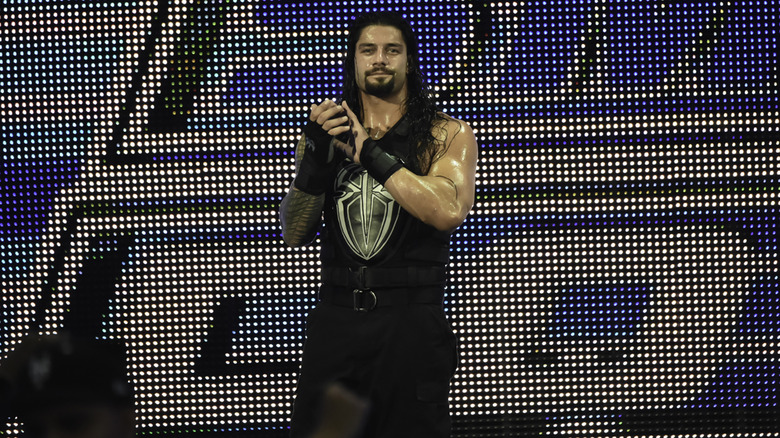Facts About WWE SmackDown Only Hardcore Fans Know
"SmackDown," also known as the blue brand, launched as a second weekly WWF/E brand at a critical time in wrestling. The first episode of "SmackDown" aired on April 29th, 1999. This was right around the time when it was becoming clear that the WWF was about to take over the wrestling scene. Talent from WCW and ECW were jumping ship to the WWF in search of a better paycheck or more stable job security. "SmackDown" played host to the evolving WWF brand and allowed more talent to be showcased on a weekly basis.
"SmackDown" to this day allows space for new talent to grow, along with expand storylines started on "Raw." It has sometimes been referred to as the "B"-show, as it has never been considered the "flagship show" of the WWE. With that being said, from a financial standpoint, "SmackDown" has become a desirable brand with Fox acquiring the broadcast in 2019 for over $1 billion. Over the years, "SmackDown" has created its own unique history and moments that help set it apart from its counterpart, "Monday Night Raw."
The Rock gave SmackDown its name
The Rock is known for being one the best promos in wrestling. Throughout his career he has created and enthusiastically expressed many different catchphrases on the microphone that have stuck with fans and often worked in a "call and response" manner with the live crowd. The Rock has graced audiences with repeatable phrases such as, "know your role and shut your mouth," it doesn't matter what your name is," and many more.
According to the book "WWE: History of WrestleMania" by Brian Shields and Kevin Sullivan, The Rock often referred to "SmackDown" in its early days as "his show." This was a direct reference to the fact that the show's name was derived from one of his many catchphrases, about how he'd "layeth the SmackDown" on an opponent. Although the Rock has not appeared on the show that much in comparison to the years it has been running, the name has taken on a life of its own. In 2007, the word "SmackDown" was even added to the Merriam-Webster Collegiate Dictionary. This means, since 2007, anyone can lay the "SmackDown" on their Scrabble rivals, with this wrestling acquired term.
SmackDown was originally going to be an all women's show
WWE has pushed its women's division a lot over the last decade, but when "SmackDown" debuted in 1999, the women's division was very much on the back burner. Due to this, it may come as a surprise that Vince McMahon and Bruce Prichard discussed "SmackDown" being an all women's show in its early days. On Episode 116 of "Something to Wrestle With Bruce Prichard," Prichard explained why this never came to fruition, "We looked at it, but we just didn't have the depth to do it on a consistent basis week after week. We really didn't have enough talent to do that ..."
In addition, Prichard said that Vince thought that maybe this wasn't the best route for a broadcast television show. It was a big risk for McMahon to take, not knowing how much interest or television views an all-women's show would bring in. About a two decades later WWE put on the first all women's pay-per-view, Evolution, that brought a lot of eyeballs to the screen. With the success of Evolution in 2018, it is possible that WWE brings the idea of an "all women's show" to reality one day.
The Hardcore Championship was the first title change on SmackDown
Many people don't want to remember the Hardcore Championship feud between Al Snow and Big Boss Man, which included Al Snow inadvertently eating his dog and the two facing off in a Kennel From Hell Match. However, this feud plays an important role in the history of "SmackDown."
On the August 23rd, 1999 episode of "Monday Night Raw," Big Boss Man stole Al Snow's beloved dog, Pepper, while Snow was busy defending his Hardcore Championship. This led to a disturbing segment on the September 2nd, 1999 edition of "SmackDown," where Big Boss Man made Al Snow dinner in his hotel as an apology for stealing his dog. Boss Man said Pepper was at the groomers, but later reveled that Al Snow was actually eating Pepper, making Snow spit out his "food," vomiting, and a physical brawl ensued.
This led to the notorious Kennel From Hell Match at SummerSlam that year, but also led to a Hardcore Championship match on the "SmackDown" following SummerSlam. Big Boss Man picked up the victory and won the Hardcore Championship, marking the first title change on the blue brand's history. This led to a short 13 day reign for Big Boss Man and marked a piece of "SmackDown" history, but it also signified a time when fans would finally get a chance to start forgetting this nauseating feud.
Mr. McMahon won the WWF Championship in the first year of SmackDown
Vince McMahon, who was once the CEO and lead man in charge of WWE/F, could do whatever he wanted with his wrestling company, even make himself a world champion. Throughout the history of the WWE/F, the McMahon family members have held various championships in the company. Mr. McMahon himself, for example, was once ECW Champion in 2007. The first time Mr. McMahon won a world title in his own company was on "SmackDown," when it was still less than a year old.
In 1999, Vince McMahon was one of the top heels in his own company, thanks to his hand in the Montreal Screwjob and storylines with "Stone Cold" Steve Austin. Leading into the September 16th, 1999 episode of "SmackDown," Vince McMahon found himself in a feud with Triple H, who was breaking away from DX partner, Shawn Michaels, and giving a singles run a try. Mr. McMahon and Triple H faced off for the WWF Championship on "SmackDown" with Shane McMahon as the special guest referee. Mr. McMahon, with the help of his long time foe, Steve Austin, won the WWF Championship from Triple H. This match marked the first time the boss had won a world title, and was arguably the first massive title change in "Smackdown" history (via Talk Sport).
SmackDown helped WWE's over inflated roster in the early 2000s
When "SmackDown" first aired, the WWF was still in a heated ratings war with WCW. Eventually, in 2001, WWF bought both WCW and ECW, giving them the rights to their trademarks, tape library, and most importantly, their talent. The problem was, this led to the WWF having an over inflated roster of wrestlers and not enough TV time to showcase them properly. A solution to this problem came in 2002 when the WWE decided it was time for a brand split, where "Raw" and "SmackDown" would run as different entities with their own look and wrestlers.
In an interview with WWE Network (h/t Republic World), Mark Henry explained how having "SmackDown" as a second show was beneficial to everyone under WWE contract: "There was too much talent for one show. You had 30 guys sitting around in the locker room not being able to get TV time. So the brand split was like the best thing since sliced bread, because now you have got another 8 guys, 12 guys, able to go and have a platform." Although other forms of the brand split have come and gone over the years, "SmackDown" has still helped lesser known WWE talent get the screen time they need when "Raw" is overcrowded.
Jim Johnston provided vocals for the first ever SmackDown theme, and they're all gibberish
Jim Johnston has produced some of the most iconic theme songs in wrestling. Between 1985 and 2017, Johnston was responsible for the theme songs of The Undertaker, The Rock, Stone Cold Steve Austin, and many more that have become iconic along with the character they accompany. Jim Johnston does not sing the lyrics in these signature sounds, but he made an exception for two songs, Dude Love's and the first "SmackDown" theme song, "Everybody on the Ground."
Johnston says that he was hearing all the popular metal songs at the time and couldn't believe how unintelligible the lyrics were. He decided to write the first "SmackDown" theme song with a heavy metal instrumental, but could not find a singer. As such, Johnston would sing the lyrics himself. In an interview with the Village Voice, Johnston confessed that the lyrics in the song are really not lyrics at all: "There are no lyrics, I just sang gibberish. I had fans contact me for a lyric sheet which, of course, I could not provide."
Michael Cole got his commentating start for WWE on SmackDown
Michael Cole has made a name for himself being the "the voice of WWE." Cole has been a key part of WWE's commentary team for over two decades. Before that, Cole was a backstage commentator for "Raw is War," capturing the promos gluing together the major storylines of the broadcast. When "SmackDown" began its weekly television shows in 1999, Michael Cole was selected to be the play-by-play announcer on the blue brand. Cole was teamed up with Jerry "The King" Lawler for the first two years of the show's life.
In 2001, Lawler left the broadcast table on "SmackDown" and Cole was partnered with "The Human Suplex Machine" Taz. The two quickly developed a great dynamic at the commentary booth and called a majority of the major moments and storylines in the early years of "SmackDown." Michael Cole did an interview with USA Today speaking fondly of his time at the table with Taz: "There's certain people you know are going to make it as commentators when they haven't had the experience before. The first guy that comes to mind is Taz." Cole's intuition was correct, as Taz has found success in both the Impact and AEW commentary booths as well.
WWE's reason for getting rid of the SmackDown Fist
When the brand split occurred between "Raw" and "SmackDown" in 2002, the two different brands began to take on a life of their own. One thing that set the two shows apart was the look of the entrance ramps. "Raw" had a panel of video walls with the signature red hue and "SmackDown" had a giant fist punching through a mirror wall with its signature blue hue. The "SmackDown" Fist came about because on the August 9th, 2001 episode of "SmackDown," Rhino Gored Chris Jericho through the original set, retiring it for good. The week after, the "SmackDown" Fist debuted and a new era of "SmackDown" was born.
The fist graced audiences until January of 2008. At the start of 2008, as acknowledge by WWE.com, WWE was updating their presentation to high definition. WWE officials felt that the "SmackDown" Fist did not translate well to this new high definition look. They felt the entrance ramp needed to be cleaner and sleeker looking. Aside from an appearance in the Firefly Fun House match at WrestleMania 36, we have not seen the "SmackDown" fist since. The look of the fist is nothing but nostalgic now, but many fans hope that one day, potentially on a special episode of "SmackDown," the fist can punch through the wall one more time.
SmackDown had the only Buried Alive Match to happen on a weekly show
The September 9th, 1999 episode of "SmackDown" was host to the only Buried Alive Match to happen on a weekly WWE show. The Rock and Mankind (Rock N' Sock Connection) defended their WWF Tag Team Championships against the Unholy Alliance of The Undertaker and The Big Show. The match did not last long in the ring, as the teams brawled around ringside and eventually The Rock and Mankind had a two-on-one advantage, sending Big Show into the open grave. Undertaker prevented the Rock N' Sock Connection from burying The Giant in dirt.
The most well known spot of the match came when Big Show hurled Mankind across the stage and he bounced off the gravesite and into the hole. Mankind tried to fight his way out of the grave, but the strength of Big Show and Undertaker was too much. However, Triple H, one of Mankind's foes, interfered at the end of the match, cracking Big Show over the head with his trusty sledgehammer, and burying Mankind himself. Despite Triple H stealing the honors of burying the opponent, Big Show and Undertaker still won the match and also the WWF Tag Team Championships. There has yet to be another Buried Alive Match on WWE television.
SmackDown was the host to the first non-PPV Money in the Bank cash-in
The Money in the Bank briefcase is always an exciting concept, because a wrestler can cash in their opportunity for a world title at any place and any time. In 2007, Edge won the Money in the Bank contract by defeating Mr. Kennedy on "Raw," winning himself his second Money in the Bank briefcase of his career. Prior to Edge's win in 2007, all the Money in the Bank briefcase cash-ins had happened at pay-per-view events. In this year, "SmackDown" was taped on Tuesdays and aired on Fridays so major title changes or storylines moments were not super common.
However, the May 11th, 2007 episode of "SmackDown" was an exception. The advertised main event had the current World Heavyweight Champion, The Undertaker, defending his championship against Batista inside of a steel cage. The match ended in a draw with both Undertaker and Batista's feet hitting the ground at the same time. Undertaker was wearing the wounds of a steel cage match and was vulnerable for an attack from "The World's Strongest Man," Mark Henry. Henry made Undertaker's situation go from bad to worse. Edge's music hit, he cashed in his Money in the Bank briefcase, and won himself the World Heavyweight Championship from a battered and broken Undertaker, marking the first Money in the Bank cash-in to happen on weekly WWE programming.
SmackDown has moved networks and nights many times
"Monday Night Raw" has been pretty consistent on what channel and day it airs. "Raw" has been on Mondays since 1993 and with the exception of a few years on TNN/Spike TV, "Raw" is synonymous with the USA Network. On the contrary, "SmackDown" has landed itself on many different days and networks since debuting in 1999. "SmackDown" started on Thursday nights and ran on the United Paramount Network (UPN) from 1999 to 2006. In 2005, "SmackDown" was moved from Thursday to Friday nights. When UPN merged with WB in 2006, "SmackDown" was moved to the CW.
In 2008, the CW didn't renew their contract with "SmackDown" and the brand was moved to MyNetworkTV on Friday nights. MyNetworkTV was seen as a demotion in networks because it was available in less homes than the CW. The tenure "SmackDown" had with MyNetworkTV ended in 2010 and from here "SmackDown" bounced around to the USA Network and SyFy, jumping between Thursday, Friday, and eventually going live on Tuesdays. In June of 2018, Fox and WWE announced a five year deal where "SmackDown" would air live on Friday nights on the Fox Network. The switch to a major channel was a lucrative deal and a huge help for "SmackDown" viewership. Currently, the "SmackDown" deal with Fox is set to end in 2024, and time will tell whether "SmackDown" will remain on Fox or need to find a new home once again.
SmackDown has always been a PG show
In the late 1990s, the WWF changed the rating of "Monday Night Raw" to TV-14, matching their edgier product during the Attitude Era. WWE continued with the TV-14 rating on "Raw" until the summer of 2008, when they changed their programming back to TV-PG. Many might assume that during the early years, "SmackDown" was also rated TV-14, but "SmackDown" has actually always been rated TV-PG. During the TV-14 era, WWE pedaled its most shocking and controversial material to "Raw." "SmackDown" was home to tamer segments and more "family friendly" content, despite Brock Lesnar pushing a wheelchair bound Zach Gowen down a flight of stairs, Kurt Angle shooting Big Show with a tranquillizer dart in the rear, and Al Snow by accidently eating his dog, to name a few.
The TV-PG rating of all WWE content has stuck since 2008, but in 2022, there were rumors swirling that WWE may think about heading back toward the TV-14 rating. WWE's weekly competitor, AEW "Dynamite," runs a TV-14 rating every week which could put the pressure on WWE one day to change their approach on their shows' rating. However, it would be interesting to see if WWE stayed with tradition and kept "SmackDown" the TV-PG alternative (via USA Today Sports).
